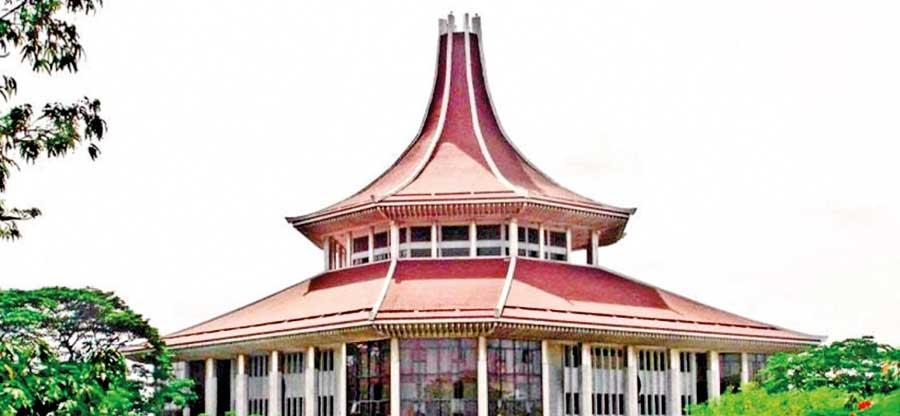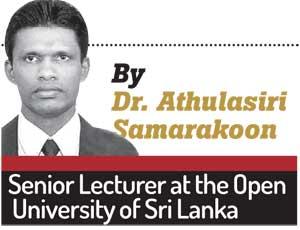09 Oct 2020 - {{hitsCtrl.values.hits}}
The Second Wave of the Covid-19 and the 20th Amendment:

At the time of writing, several areas in the Gampaha District (in the Western Province) have been closed due to the re-emergence of hundreds of Covid-19 cases. This could be the beginning of a second wave, and suppressing it is  reportedly one of the most serious challenges facing health bureaus. During its first wave, the Covid risked postponing the general election and holding it later. But after the election, fears and preparedness about the danger among the people gradually waned.
reportedly one of the most serious challenges facing health bureaus. During its first wave, the Covid risked postponing the general election and holding it later. But after the election, fears and preparedness about the danger among the people gradually waned.
However, we must collectively face the threat of the Covid again, and it goes without saying that the government is paving the way for its political objectives in addition to curbing the Covid. Rather than thinking about democracy and economic development beyond the Covid, we now must defend democracy against the 20th Amendment, which came with the second wave of the Covid. Therefore, we have to look once again at the politics of the pandemic.
"In stark contrast to the general law principles, the 20A will establish a regime that wants to govern with what it calls ‘strict laws’ (the executive’s law, and therefore, an exception) in the name of democracy"
Corona that boosts dictatorship
In his latest book Pandemic, Slavoj Zizek states that a statement he made that the Corona virus epidemic could boost communism’ was ridiculed. But he notes that ‘although China’s tough approach could control the corona situation better than other countries, it showed ‘the limits of the authoritarian approach of the old communists’. For example, he cites what happened to those who had first reported about the new virus.
What should we learn from this situation as a democratic state? That is, one might argue that authoritarian or dictatorial regimes may at times appear to be better than the complexities or confusions of democracy, and that such a regime can help us recover from existing economic and political breakdowns.
But that may not be as accurate as the assumption that ‘communism’ could develop in the development of (Chinese) communist rule. An illustration like ‘exchanging chilli for ginger’ (bringing a despot to curb economic woes when democracy is ailing) also does not accurately capture the anti-people conditions that may arise in that situation.
In stark contrast to the general law principles, the 20A will establish a regime that wants to govern with what it calls ‘strict laws’ (the executive’s law, and therefore, an exception) in the name of democracy. Further, the 20A glorifies the repressive apparatus of the state, including the police and the military, and creates a culture of suspicion and a society always overseen by the State. Should a democratic Parliament allow the 20A, which makes the sole will of the ruler the law?
Therefore, everyone who creates false intellectual arguments about the 20A knows that the end of the democratic space created by the 19th Amendment is likely to dawn soon, if the Supreme Court decides that a referendum is not required and the 2/3rd majority pass it, as is predicted. Our puzzling question here is how far can the current attempt to amend the Constitution lead to authoritarian or dictatorial rule? How will it change the basic essence and structure of democracy in this country where authoritarian populism has swayed the public in a time of pandemic?
"The Constitutions of this country in 1947, 1972 and 1978 were created in environments conditioned by the basic character of class, economy and society as well as international balance of power prevailed then"
There are no definitive politico-scientific answers to any of these questions. Every answer is a hypothesis, not a definite one. We can, therefore, offer several clues as to the potential threat to the basic architecture of liberal democracy and its value system. On the other hand, what are the basic observations we have got to assume that the 20th Amendment is a situation that is totally contrary to democracy as explained above? My guess is, it is an extension of the same argument that has been raised by many scholars in this country against the ‘executive presidency’ and its power structure since 1978.
But when that logic is put forward in the present moment, the set of meanings (implications) it conveys is not the same as it was in 1978, 1994 or 2015. This is because both the circumstances and the contexts and personal factors that motivate the drafting of the constitution have undergone a great deal of distortion (perversions) in the present moment. Let’s summarise them one by one.
Conditions and the context
The Constitution does not come down abruptly or from the sky. It is reconfigured (or interpreted) according to the constant dynamics of the power structure that exists in a class society. The constitutions of this country in 1947, 1972 and 1978 were created in environments conditioned by the basic character of class, economy and society as well as international balance of power prevailed then. When the 18th Amendment, introduced in 2010, representing the ‘supremacy’ of Sinhala-Buddhist society after the war, was defeated by a democratic uprising (the 19th Amendment in 2015), the nationalist camp was constantly active against it. The racist factions supporting the camp were increasingly active against the Muslim population and creating crises; also, when the glorification of war heroes receded, the retired army personnel were strong against it. Several Sangha groups waged a constant struggle to return to the Rajapaksa era; the camp of good governance shook internally; in the meantime, Saharan caused a great catastrophe. And finally, against all odds Gotabhaya Rajapaksa became the president and militarisation increased with the epidemic. Today, subsequently, the nationalist camp has invaded Parliament with immense power, and they are drafting a constitution that will reverse democracy.
Personality factor
Now, the state is led by a very popular leader. But his practices constantly call into question the complexity of democracy. His priority is the military and intelligence in development, problem solving, epidemic control, and administration. He also served in the Army and was the Secretary of Defence of Sri Lanka. He wants to rule as Lee Kuan Yew or Mahathir Mohamad did. He demands that ‘his word be the law’. He sees the 19A as a prison. But with the 20A, we see him released and the whole country imprisoned. People also think he’s good to rule with the Covid-19 and we do not mind doing it with the 19A.
Our concern is the basic framework of democracy; the fear that a rigid power structure could lead to dictatorship in a power structure without checks and balances. But he thinks development is superior to democracy. However, the development that can be achieved by imprisoning the people does not belong to the people. Development can be freedom itself as well. However, we emphasise that our opposition to the 20A is not to the majority’s government but only to preserve our democratic rights against the tyranny of the majority.
24 Oct 2024 39 minute ago
24 Oct 2024 3 hours ago
24 Oct 2024 3 hours ago
24 Oct 2024 4 hours ago
24 Oct 2024 4 hours ago